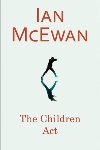Sir David Bell, vice-chancellor, University of Reading, is reading Rick Perlstein’s Before the Storm: Barry Goldwater and the Unmaking of the American Consensus (Nation Books, 2009). “Defeat for right-winger Barry Goldwater in the 1964 US presidential election could not have been more comprehensive. But in his highly original analysis, Rick Perlstein marks it as the moment the conservative political revolution in America began. Fifty years on, we can still feel the reverberations. Full of rich detail and a cast of colourful and extreme characters, this is a persuasive story.”

Nick Bevan, pro vice-chancellor and director of library and student support, Middlesex University, is reading Ian McEwan’s The Children Act (Jonathan Cape, 2014). “The McEwan hallmarks are there – the extended opening drawing in the reader, the precise prose informed by meticulous research – and this time his ending doesn’t disappoint. It was the central legal conundrum that held my attention; the parallel story of the protagonist’s marriage didn’t quite connect and engage. But it’s absorbing and, almost a novella, it doesn’t outstay its welcome.”

Nigel Rodenhurst, part-time lecturer in English, Aberystwyth University, is reading Louis de Bernières’ Captain Corelli’s Mandolin (Vintage, 1998). “This novel seems to have everything – tragedy and comedy, personal lives and history. A tall tale and a serious work of literature, based on themes of lost love and redemption, its reputation suggests that one ‘should’ read it, and so far I would have to agree. Louis de Bernières is right up there with the great storytellers.”

Constantine Sandis, professor of philosophy, Oxford Brookes University, is reading Arthur C. Danto’s What Art Is (Yale University Press, 2013). “This accessible book is the culmination of the late Danto’s lifelong investigation into the concept of art. Through an inspired range of historical and contemporary examples, he explicates his institutional definition of artworks as ‘embodied meanings’ that can take on just about any shape or form. In this radical view, the properties that render something a work of art are invisible.”

Peter J. Smith, reader in Renaissance literature, Nottingham Trent University, has just read Graham Joyce’s Leningrad Nights (PS Publishing, 1999). “This muscular novella recounts the bleak determination to survive the Nazi siege of Leningrad in the Second World War. Leo, its teenage protagonist, rescues a prostitute and her unborn baby from starvation with the aid of several alter-egos. It is a painful, compassionate story that fuses a plain prose style and a symbolic profundity in the manner of William Golding. Joyce was a friend and colleague of mine who died in September. His recent passing makes this story all the more weirdly momentous.”

